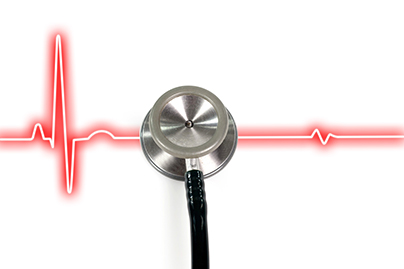An arrhythmia is an abnormal heart rhythm caused by a disruption in the heart’s electrical system. Arrhythmias cause irregular heartbeats, which may not cause any symptoms and may be benign or may result in severe morbidity.

There are many types of arrhythmias each with varying prevalence rates in the U.S. Some examples of arrhythmias are premature atrial contractions (PACs), premature ventricular contractions (PVCs), bradycardias, atrioventricular (AV) blocks, atrial fibrillation, atrial flutter, supraventricular tachycardia, ventricular tachycardia, and ventricular fibrillation. Atrial fibrillation is a common arrhythmia and its prevalence rate was estimated to be 2.7-6.1 million in 2010. This is expected to rise to 5.6-12 million by 2050.1
Some patients may not experience any symptoms, however, others may experience palpitations, dizziness, fatigue, lightheadedness, syncope, chest pain, shortness of breath, and anxiety. Arrhythmias such as ventricular fibrillation can cause cardiac arrest.
Arrhythmias are usually due to underlying heart disease. The most common causes are coronary heart disease, myocardial ischemia, and infarction. Damage to the heart will cause dysfunction in how electricity travels through the heart muscle, leading to irregular contractions. Therefore, arrhythmias and coronary heart disease share similar risk factors, such as high blood pressure, high cholesterol, diabetes, obesity, inflammation, low nutrient diet, and smoking. Other causes include medications; abnormal electrolytes, such as low magnesium and potassium; lung disease; sleep apnea; hyperthyroidism; and alcohol use.
An exercise routine is essential in promoting cardiac health. Routines should be catered to the individual patient as some patients may experience episodes of arrhythmias with aggressive exercise, so limitations may be necessary.
ONLINE: All members of DrFuhrman.com can search the Ask the Doctor archives for discussions on this topic. Platinum and Diamond members can connect with Dr. Fuhrman by posting questions in the forum. Not a member? Join now.
IN PERSON or ONLINE: Book a consultation with a specialist at Longevity Rx in San Diego, California, run by Joel Fuhrman, MD and Cara Fuhrman, ND. Using nutritional protocols, cutting-edge screening tools, advanced imaging, and innovative treatments for pain and injuries, they'll create a personalized action plan to help you prevent and recover from illness, and achieve your optimal weight. Book online at Longevity Rx or call +1 (858) 367-3558
EVENTS: Join Dr. Fuhrman for an online boot camp, detox or other event. During these immersive online events, you’ll attend zoom lectures, follow a special meal plan, and have access to a special, live Q&A session with Dr. Fuhrman. Learn more about events.
*Foods containing at least 0.4 grams per serving of plant sterols, taken twice a day with meals for a daily total intake of at least 0.8 grams, as part of a diet low in saturated fat and cholesterol, may reduce the risk of heart disease. LDL Biotect provides 0.54 grams of plant sterols in each two-capsule serving.
The following are sample questions from the Ask the Doctor Community Platinum and higher members can post their health questions directly to Dr. Fuhrman. (All members can browse questions and answers.)
I was just told that I have atrial fibrillation. How can nutritional excellence help? Do weight and diet have anything to do with this?
Of course, it has everything to do with weight and diet. It can be caused by atherosclerosis, high blood pressure, thyroid disease, as well as chemical stress from medications and other toxins.
The first step is to get back into excellent health. A Nutritarian diet can reverse atherosclerosis and aid in the removal of toxic metabolites and chemicals. I also recommend you eat walnuts, hemp, and chia seeds every day, as well as take a DHA/EPA supplement to assure the proper fatty acid levels.
Since starting to follow a Nutritarian diet, I have reduced my salt intake significantly. Based upon your advice, the only salt I get is derived naturally from whole foods. Occasionally, I get some salt from canned vegetables.
Since reducing my salt intake, my heart arrhythmias have all but disappeared. I have exercised regularly for many years. Could the salt restriction have had a beneficial impact on the arrhythmias?
I think that is fantastic that you have improved your health so much.
Yes, reducing salt benefits arrhythmias. Excessive sodium blocks a crucial potassium channel called HERG. HERG channels, donut-like pores that let potassium cross the cell membrane, are especially important in the electrically excitable cells of the heart and brain. When they don’t work correctly, individuals are at risk for life-threatening cardiac arrhythmias and seizures. A Nutritarian diet also has anti-inflammatory effects on the heart. I do not recommend canned vegetables, use only frozen or fresh.
I’m 39 years old, and I’ve been between 200 and 210 pounds since I had my second son; prior to that I was mostly in the 130’s to 140’s (I’m 5’5"). I’ve had premature ventricular contractions and atrial premature contractions since I’ve turned 25. I am on medications for the palpitations and for high blood pressure. I’m ready to get healthy, lose the weight, and eat to hopefully reverse any damage I might have done already.
Do you know if by following the Nutritarian diet style I can control my palpitations? Are there any special suggestions you can make? I’d love to control this without medication.
I absolutely think you can recover from this because of your young age and likelihood that the heart damage you have caused is still reversible.
Do all the things I recommend. Eat lots of greens, both raw and cooked. Become thin again. Take the DHA/EPA supplement and the Women’s Daily multi. Get in the healthiest biochemical condition of your life, and you will be amazed what can be accomplished!